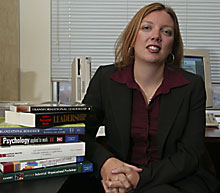Charismatic leaders get results
Kathleen Boies studied soldier's attitudes toward leaders

Kathleen Boies studied attitudes toward leadership in the Canadian Forces. Her research is being applied to Canadian soldiers in Bosnia.
Photo by Andrew Dobrowolskyj
Leaders have the choice, and the power, to rally their followers through inspiration or by reward and punishment. The inspirational style, sometimes called transformational leadership, has been exhibited in such charismatic figures as Martin Luther King Jr., Gandhi and Mother Theresa. They have galvanized the masses to work for a common good, and inspired great social change in the process.
Leadership style and how it affects the emotions and thoughts of teammates has been of great interest to Dr. Kathleen Boies. It has been a thread linking her psychology background and doctoral research to her recent appointment as an assistant professor in the John Molson School of Business.
“The leadership area has fascinated me since graduate school,” she said in an interview. “Effective leaders are such unique and exceptional people. I’m interested in what has made them effective.”
Boies’ doctoral research looked specifically at how different leadership styles are used, and to what effect, in the Canadian Forces.
“The military context is great for the study,” she said. “It is made up of small teams, each with an assigned leader and a pre-established hierarchy.”
In Boies’ study, conducted last November, members of the military were asked to fill out questionnaires on the style of their leader. They were then asked to report on their feelings and thoughts about their team.
The study showed that with the transformational style of leadership, teammates experienced positive emotions about their team members and the team’s performance. With transformational leadership, members of the team shared similar thoughts and emotions about each other, which led to trust between teammates.
“When you think similarly about the team, that increases trust. You know what to expect from others and you work well together,” Boies said enthusiastically.
The military is very interested in transformational leadership these days. First of all, the nature of their missions has changed. Secondly, soldiers are better educated than they were in the past. Leadership roles need to adapt to the current environment.
“It is difficult work when they are on these peace missions. Therefore, they need leaders that are supportive and effective,” Boies explained. “Leaders need to be more engaged with their soldiers and with the people of the other countries that they visit than they were in the past. They need to be more personable today.”
Boies’ research, which was entirely focused on the military in Canada, is currently being applied to the Canadian soldiers based in Bosnia.
“There is not a crisis in Bosnia right now, but it is a much more busy atmosphere, so it will be interesting to see what type of leadership is more effective there. By understanding the process of effective leadership we can develop better training programs.”
Boies said that effective leadership improves team members’ well-being and performance as well.
“Soldiers are more satisfied because they feel empowered, and performance increases. Things like target shooting and co-ordination have been noticed to improve under transformational leadership.”
Boies obtained her PhD in June 2003 in industrial and organizational psychology at the University of Western Ontario. She now teaches organizational behaviour at the undergraduate and graduate level.
This is her first year at Concordia, and she’s enjoying it. “The Management Department is a very dynamic and interesting department, with great thinkers,” she said, from her new office in the GM Building.